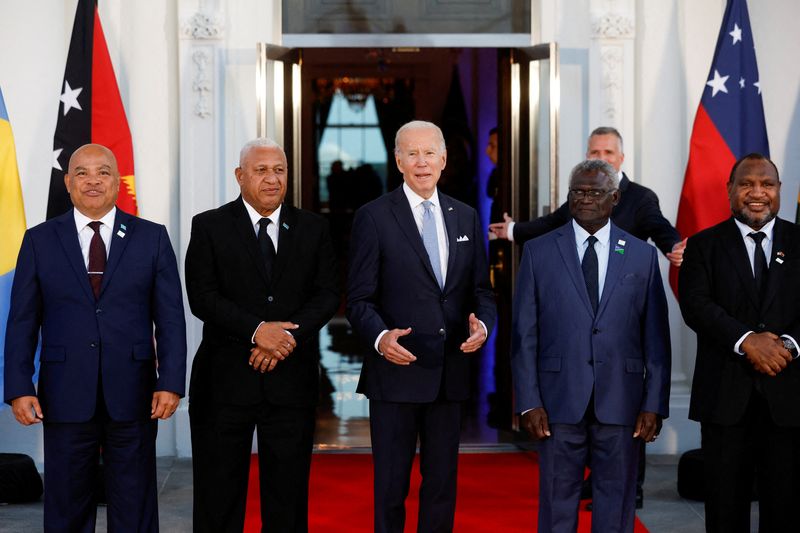By David Brunnstrom
WASHINGTON (Reuters) - A 45-day stopgap measure passed by the U.S. Congress to avert a government shutdown has left potential funding shortfalls for strategic Pacific island states, which analysts and former officials say makes the U.S. allies economically vulnerable and possibly more receptive to Chinese approaches.
The Biden administration had hoped to see Congress endorse by Sept. 30 new 20-year funding programs for Micronesia, the Marshall Islands and Palau, which after decades of relative neglect now find themselves at the center of a U.S. battle for influence with China in the Northern Pacific.
The sprawling but sparsely populated nations have ties with the U.S. governed by so-called Compacts of Free Association (COFAs), under which Washington is responsible for their defense and provides economic assistance, while gaining exclusive military access to strategic swathes of ocean.
The funding programs for the Marshall Islands and Micronesia were due for renewal by Sept. 30, and by the end of fiscal 2024 for Palau, and Washington agreed this year on a new package of $7.1 billion over 20 years, subject to Congressional approval.
The stopgap "continuing resolution" (CR) that prevented a federal government shutdown does not include approval for this new program, however, and while it maintains federal services to the COFA states, it leaves holes in other parts of their budgets.
"While keeping the services going is an important assurance, the CR will make things quite difficult in the Marshalls (which has an election on November 20) and Palau (election next year)," said Cleo Paskal, an expert on the COFA states with the Foundation for Defense of Democracies think tank.
"Both are countries that recognize Taiwan and are key components of U.S. defense architecture in the Pacific," she said. "Watch for increased (Chinese) political warfare spin around the U.S. being an unreliable partner."
Paskal said Palau's funding under its existing COFA had dwindled as it approached its final year and it had been banking on funds from the new package to help cover budget deficits.
Paskal said Palau's economy had already taken bad hits from COVID-19 and Chinese economic interference aimed at pressuring it to switch diplomatic recognition from U.S.-backed Taiwan to Beijing.
There is no new money so far too for the Marshall Islands, which has yet to finalize new terms with Washington due to disagreements over how to address the legacy of massive U.S. nuclear testing there in the 1940s and 1950s.
Meanwhile, China is waiting in the wings with ready cash.
Roll Call, a news site covering the U.S. Congress, noted last week that Palau's Finance Minister Kaleb Udui told a congressional field hearing in August that Beijing had been trying to tempt locals to oppose U.S. plans to build an early-warning radar by offering to build a hotel and casino nearby.
The Washington embassies of Palau and the Marshall islands did not immediately respond to requests for comment.
The Biden administration has made renewing the COFAs a priority, and it has broad bipartisan support, but congressional infighting is not the only hurdle.

Howard Hills, a senior adviser to the U.S. COFA negotiating team from 2020 until retiring last month, blamed the Marshall Islands holdup on U.S. State Department lawyers who wanted to control how new funds were spent and objected to them being earmarked to address the nuclear legacy, fearing this could lay the U.S. open to more claims.
Asked to comment, the State Department said Washington was "working expeditiously to finalize negotiations" with the Marshall Islands and had had constructive conversations to that end "including at the Presidential level" at last week's U.S.-Pacific Islands Forum Summit.